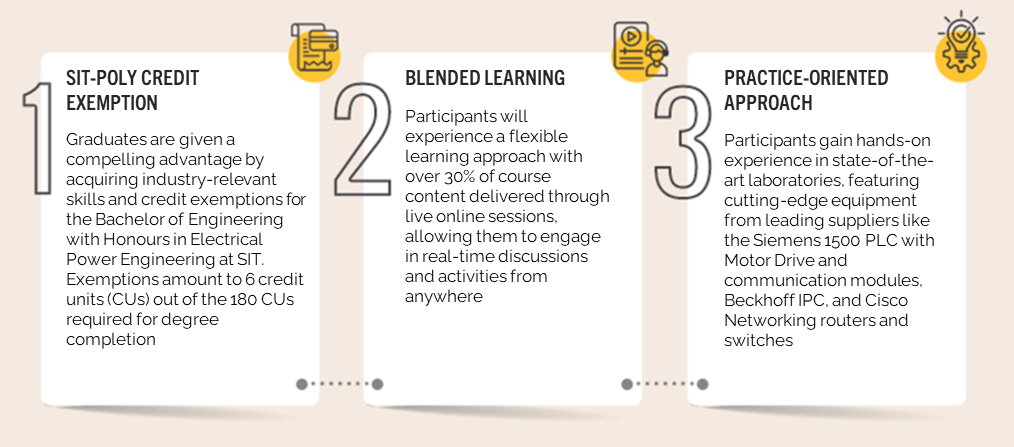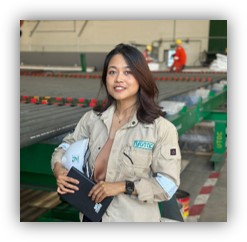
20 Apr 2026 to 31 Mar 2027
1 Dec 2025 to 1 Mar 2026
4 evenings per week, 6.30pm-10.30pm
Classroom
Please note that once the maximum class size is reached, online registration will be closed. You may register your interest and be notified when there is a new run.
Class schedule:
4 evenings a week
6:30pm - 10:30pm
(to be confirmed closer to the course commencement)
Course Duration:
480 hours (1 year)
Please refer to Academic Calendar.
Enquiries
For course specific details, please contact the course manager:
Name: Mr Wong Weng Yew
Email: WONG_Weng_Yew@sp.edu.sg
Contact No: 68790689
For other enquiries, please email to ptenquiry@sp.edu.sg
Participants are required to bring their personal computer notebook when attending lessons, as they may need it to access the e-learning materials, write reports, etc.
Are you planning to venture into the Process Control and Instrumentation industry? If you are already in this industry, are you getting ready to deepen your skills to meet the demands brought about by the rapidly evolving process control technologies, the increasing use of industrial networks in Distributed Control Systems and the increasing importance of cybersecurity in these systems?
The Advanced Diploma in Process Control & Instrumentation offers post diploma training in the area of Process Control and Instrumentation. The curriculum is flexible, designed for self-paced learning, and has e-learning components.
Participants in this course will have the opportunity to gain hands-on training in our laboratories, which are equipped with facilities from leading industrial suppliers including Siemens, Yokogawa, Endress+Hauser, Pepperl+Fuchs, Bosch, Festo and National Instruments.
The primary objective of this Advanced Diploma course is to provide working adults with the necessary skills and knowledge relevant to the Process Control and Instrumentation industry. The specialised technical modules will give a deeper understanding of knowledge and skill sets required for a graduate to work in the Process Control industry.

This course offers relevant modules in response to the evolving needs of the industry. Apart from fundamental technologies like dynamics and control theory, computer control, process control and instrumentation, this course also covers advanced topics in the modules highlighted below:
Advanced Programmable Logic Control, which provides participants with advanced concepts in the areas of control system design, advanced instruction sets, intelligent I/O modules, local area networks, supervisory control and data acquisition in PLC systems
Distributed Control System Applications, which equips participants with the skills needed for the configuration, operation, testing and monitoring of Distributed Control Systems.
Industrial Networks and Cybersecurity, which addresses both the needs of the industry in the use of industrial networks as well as the increasing importance of cybersecurity in networked systems. The use of the popular industrial communication platform, OPC UA, will also be covered in this module.
AI for Automation, which addresses the rapid integration of AI technologies in control systems. This module introduces the basics of AI and machine learning and their application in control systems
There are 4 separate modular Post-Diploma Certificates (PDC). Each PDC is designed to be completed in one academic semester and is made up of two 60 hours modules. Upon completion of four PDCs (a total of 480 hours) within a maximum period of 2 years, the participant will be conferred a qualification in the Advanced Diploma in Process Control and Instrumentation.
Participant can decide to complete 1 or 2 PDCs in an academic semester. This is to allow participants the flexibility to complete all the 4 PDCs in a minimum period of 1 year or at the maximum period of 4 years.
Please click here for Module Synopsis.
Stand out with your achievements:Participants who score a minimum grade of A in module Dynamics and Control or Process Control Engineering will be eligible for module exemption from Control Engineering in the Bachelor of Engineering with Honours in Electrical Power Engineering at SIT. |
Endorsements
This course has received endorsement from the Instrumentation and Control Society, Singapore (ICS):
“The Instrumentation and Control Society, Singapore (ICS), believes that the Advanced Diploma in Process Control and Instrumentation (NAPCI) offered by Singapore Polytechnic provides an excellent upgrading opportunity for our engineering workforce in the process control and instrumentation industry. The course offers extensive foundational training in control system basics as well as in advanced topics on PLC, Distributed Control System, AI and Industrial Networks and Cybersecurity which makes this course highly relevant to the control industry.
- Dr Yang Zhizong, President, Instrumentation and Control Society, Singapore
Testimonials
"This course exceeded my expectations by seamlessly bridging the gap between theory and practical applications. The specialised modules, combined with the guidance of supportive lecturers, made learning both engaging and rewarding. This course has further enhanced my expertise and equipped me with new insights to excel in my field."
- Thet Htar Swe Zin

For more information on minimum entry requirements and other course details, click on the “Register” button.
Course fees are reviewed periodically and adjusted as necessary to cover the cost of education and to enable the polytechnic to continue investing in delivering high-quality education.